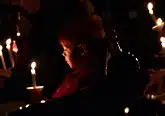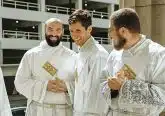The Poetry of Creation

The first creation account in Genesis 1 is among the most misunderstood chapters in the Bible. The confusion comes less from the words on the page than from a prejudicial determination of what Genesis 1 is trying to tell us. But it is in its very literary form that the message of the chapter is substantially revealed, if only we let it speak for itself. In other words, the kind of literature comprising Genesis’ first chapter is essential to its meaning. If we insist that it is a different kind of literature than it really is, we distort its meaning at the outset.
Six times, a passage begins, “Then God said … ” and each passage ends with the words, “Evening came, and morning followed.” If we considered this construction without any notion of what we are reading, it is probable we would conclude we are reading poetry or song; the repetition reminds us of poetic verses or musical choruses. This helps us see what Genesis 1 teaches us about creation when we turn to the verses’ actual content.
The six days of creation are structured in three corresponding pairs of passages, such that the first day corresponds to the fourth; the second to the fifth; the third to the sixth. Thus, creation of day and night on the first day corresponds to creation of the sun and moon on the fourth; sky and water to birds and fish; land and plants to animals of the earth (including humans). The sixth day, however, varies from the first five, as it creates two qualitatively different kinds of things: animals and humans. On the sixth day, God first creates all the animals that are not human (Gn 1:24-25). But then “God said: ‘Let us make man in our image after our likeness … God created man in his image; in the divine image he created him; male and female he created them” (Gn 1:26-27). The human creature has “dominion” over all the other animals and fish (Gn 1:28); and the seed-bearing plants (from day three) are created as his food (Gn 1:29).
This poetic ordering tells us we are not reading a scientific account of the “how” of creation. Instead, both by the literary form and the orderly content of the prose-poem, the author is making a claim that the universe is orderly and purposeful. From the account’s form and content, we can reasonably surmise that Genesis’ author is suggesting creation has a poetic structure and order. We might even say that the universe is itself the poem, spoken by God and recorded by the sacred author.
Of course, the first creation account ends with a seventh day, but this day is different from the other six in two important ways. First, it does not begin with the words, “Then God said” followed by an act of creation. No work of creation occurs on the seventh day, at all. It just “is.” God was finished with the work He had been doing, so He “rested” on and “blessed” the seventh day. This implies that the seventh day may be identified with God Himself, a suggestion supported by its second important difference from the first six days. Unlike the first six days, the seventh day does not have a day to which it is paired. Instead, all six days of creation are ordered toward the seventh. The seventh day is the day of rest in God; or we might even suggest the seventh day is rest in God. It is the day toward which all the work of creation is oriented.
Thus, this creation account gives us the very foundation of the cause and purpose of our moral lives. It provides an account of the end and purpose toward which all creation is ordered. Creation (including the crown of creation, the human person) is properly ordered when— and only when—it is oriented toward God. Theologians call this idea “teleology,” from the Greek word “telos,” which means “end,” “goal,” or “purpose.” Catholic moral theology is wholly built upon this foundation: that all creation is ordered toward its final purpose of rest (sabbath) in God. Thus, our moral lives are to be lived in such a way that they are consistent with that purpose.
Put another way, Catholic moral theology does not begin with assertions about what we must or must not do. Rather, it begins with an understanding of who we are in the perfection of creation. That is, we are beings to whom and for whom all creation is ordered; and in turn, we are ordered toward Sabbath rest in God. Moral theology is the discipline of articulating how this truth is translated into our practical lives. Catholic moral doctrine is not a collection of arbitrary rules for the sake of controlling us. Rather, it is a collection of principles and doctrines to guide us toward the good life of rest in God. Catholic moral doctrine is about who we are, properly considered, and, therefore, who we must become. The first creation account teaches us, in a world that is otherwise ordered toward us, that we are ordered toward peace with God. And so, Genesis 1 is a prose poem telling us that creation itself is poetic symmetry, ordered by and toward rest in God. ✣
 Dr. Kenneth Craycraft holds the James J. Gardner Chair of Moral Theology at Mount St. Mary’s Seminary & School of Theology. He is the author of Citizens Yet Strangers: Living Authentically Catholic in a Divided America.
Dr. Kenneth Craycraft holds the James J. Gardner Chair of Moral Theology at Mount St. Mary’s Seminary & School of Theology. He is the author of Citizens Yet Strangers: Living Authentically Catholic in a Divided America.
This article appeared in the October 2025 edition of The Catholic Telegraph Magazine. For your complimentary subscription, click here.













